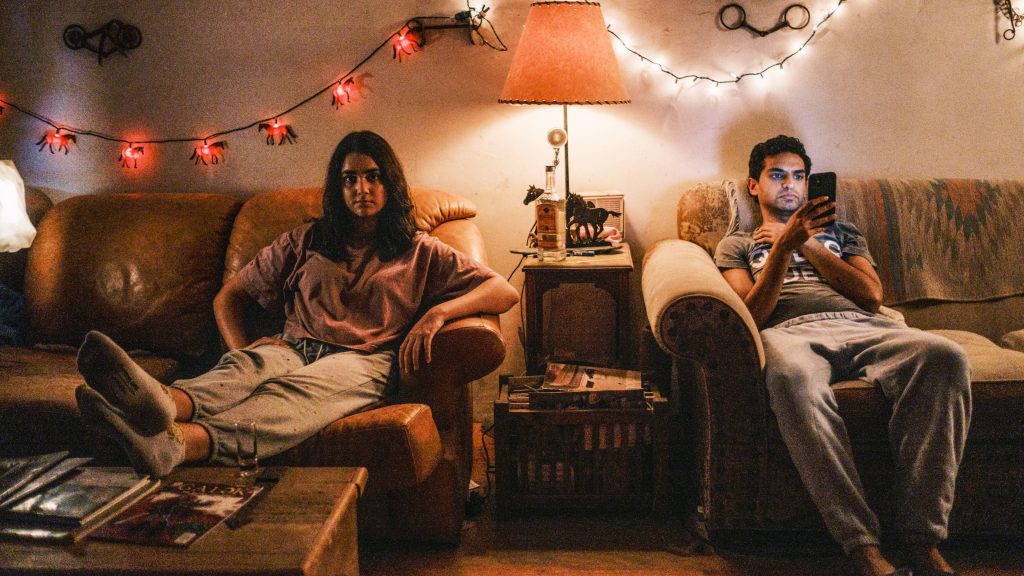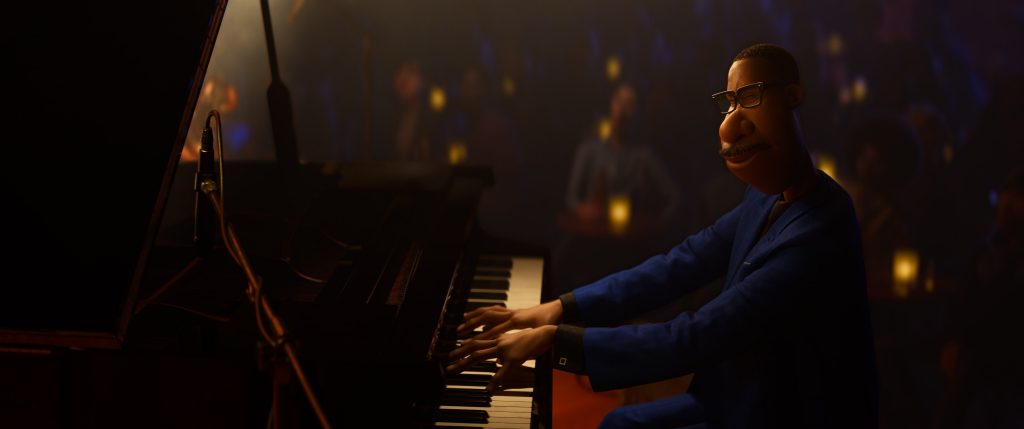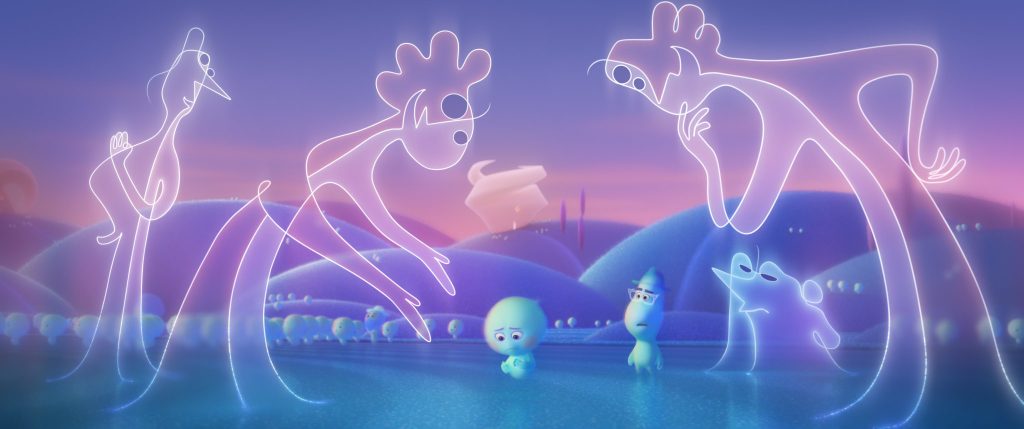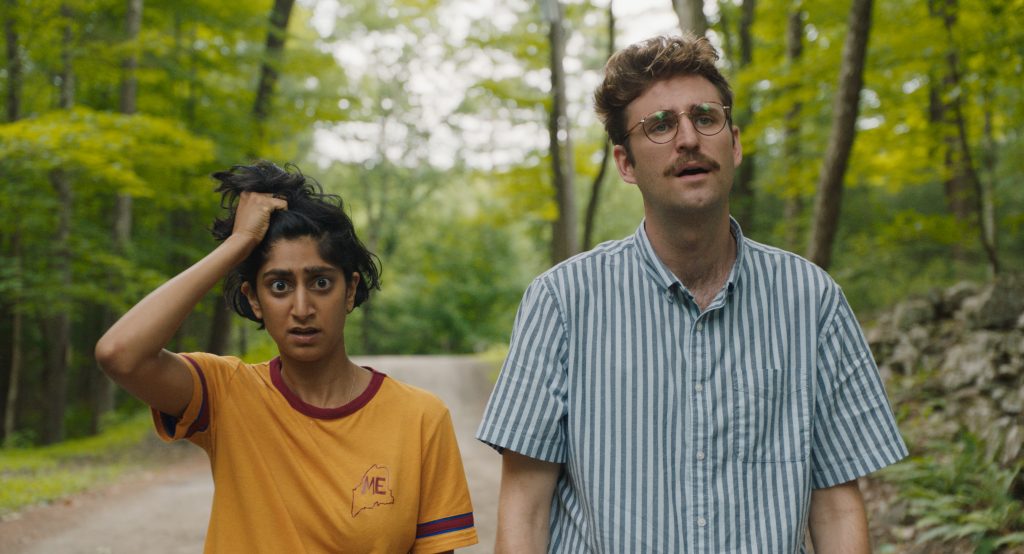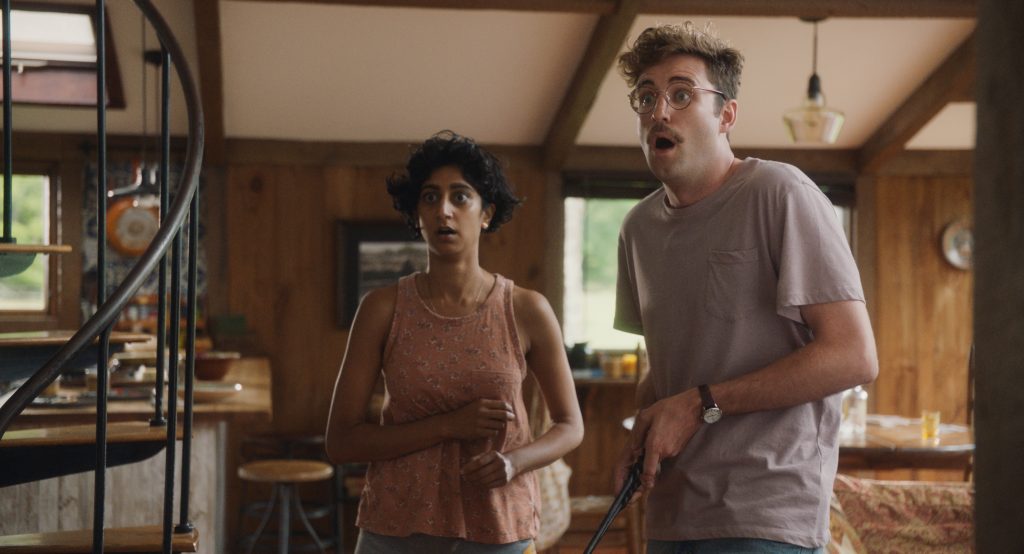November 8, 2023
by Carla Hay
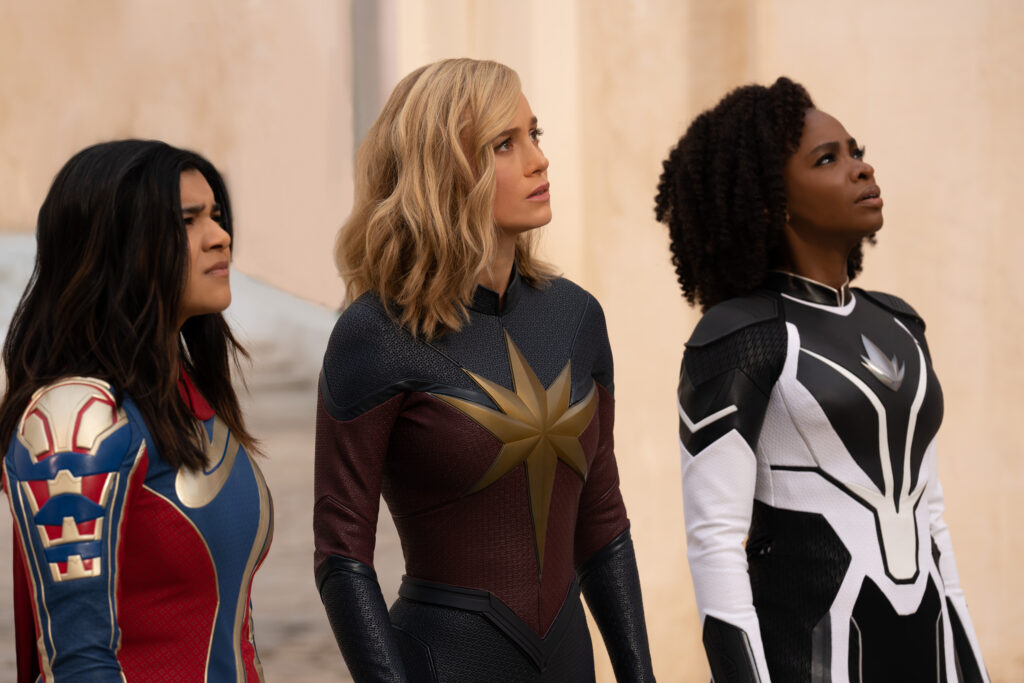
Directed by Nia DaCosta
Culture Representation: Taking place on Earth and the fictional planets of Hala and Aladna, the sci-fi/fantasy/action film “The Marvels” (based on Marvel Comics characters) features a cast of racially diverse cast of characters (white, black and Asian) representing superheroes, regular humans and alien creatures.
Culture Clash: Earth superheroes Carol Danvers, Monica Rambeau and Kamala Khan team up to battle Kree leader Dar-Benn, who wants to become the most powerful person in the universe.
Culture Audience: Besides appealing to the obvious target audience of Marvel movie fans, “The Marvels” will appeal primarily to people who are fans of the movie’s headliners and don’t mind watching superhero movies that have mindless dialogue, subpar visual effects and unimaginative plots.
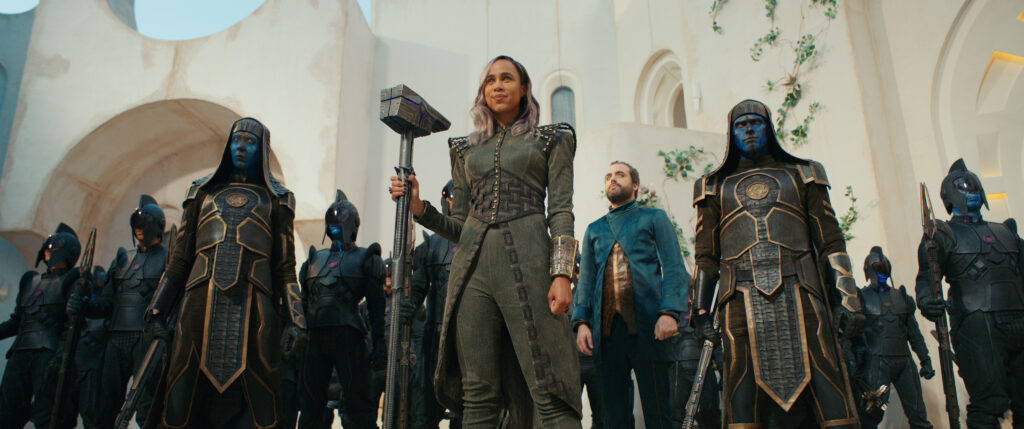
“The Marvels” should be called “The Debacles.” This superhero disaster is proof that a bloated budget and talented cast members can’t save a low-quality movie that is an embarrassment to everyone involved. Tacky cartoons have better dialogue than this mess.
Directed by Nia DaCosta, “The Marvels” is not only one of the worst movies of the Marvel Cinematic Universe (MCU), but it’s also one of the all-time worst big-budget movies based on comic books. And that’s saying a lot when creatively bankrupt flops like 2022’s “Morbius” and 2022’s “Black Adam” exist. At least those other movies had a better sense of their cinematic intentions. “The Marvels” (a sequel to 2019’s “Captain Marvel”) is an irritating and erratic film that wants to be many different types of movies at once but fails at being any type of movie.
“The Marvels” is an onslaught of terrible screenwriting, shoddy visual effects, and fight scenes thrown into an already mindless plot. The fight scenes try to dazzle with intricate choreography, but all of it is wasted when the outcomes of the fight scenes are so underwhelming. This mishandled action happens so frequently in “The Marvels,” it makes you wonder if “The Marvels” filmmakers forgot the meaning of “suspenseful action.”
“The Marvels” also relentlessly punctuates almost every scene with weak jokes that often look and sound very fake and awkward for these characters, which are based on Marvel Comics characters. And this is not a joke: In one of the fight scenes, lead superhero Carol Danvers/Captain Marvel (played by Brie Larson), who’s supposed to be one of the most powerful and fearless Marvel warriors of all time, whines like a wimp, “Please don’t,” to her villain opponent who’s about to attack. It’s pathetic and a complete insult to the Captain Marvel character.
Audiences already know that most superhero movies have a plot about superheroes trying to save the world from an evil villain or villains. That’s not a problem if the story is well-crafted and has characters that can engage audiences. The problem is when a movie like “The Marvels” does the opposite. DaCosta, Megan McDonnell and Elissa Karasik co-wrote the abysmal screenplay for “The Marvels,” which renders all of the characters as shallow vessels to spew out cliché-filled conversations and unfunny jokes. There are 10-year-old kids who can write better dialogue than what’s in “The Marvels.”
In “The Marvels,” the chief villain is Dar-Benn (played by Zawe Ashton), a former scientist who is now a Kree politician leader obsessed with reclaiming supremacy for her Kree beings who live on her home planet of Hala. Captain Marvel, who is nicknamed The Annihilator by the Kree beings, is considered the ultimate enemy of the Kree, based on events that happened in “Captain Marvel.” In “The Marvels,” Dar-Benn is looking for two magical bangles (which look like long, metal braces) that give whoever wears both bangles the type of power to rule the universe. The beginning of “The Marvels” shows Dar-Benn with some of her Kree cronies on a desolate planet, where she finds one of the bangles.
The other bangle is in the possession of 16-year-old Kamala Khan (played by Iman Vellani), a Captain Marvel superfan, who lives with her parents and older brother in Newark, New Jersey. Kamala’s alter ego is the superhero Ms. Marvel. Kamala’s wide-eyed and perky mannerisms will either annoy or charm viewers. In the MCU, this character was first introduced in the Disney+ series “Ms. Marvel.” Kamala has a fixation on Captain Marvel that borders on unhealthy. Kamala’s room is filled with Captain Marvel memorabilia, and she draws comic strips with fantasies of Captain Marvel interacting with Kamala.
Meanwhile, astronaut captain Monica Rambeau (played by Teyonah Parris) is on an exploratory mission in outer space. The adult Monica made her first MCU appearance in the Disney+ series “WandaVision.” Monica’s history with Carol Danvers/Captain Marvel is that Monica is the daughter of Carol’s best friend Maria Rambeau (played by Lashana Lynch in “Captain Marvel”), who was in the U.S. Air Force with Carol. Maria created the Sentient Weapon Observation and Response Division (SWORD) to detect outer space aliens.
Maria and Carol were so close, Carol was like an aunt to Monica, who still calls her Aunt Carol. However, Carol and Monica have been estranged for years, for reasons explained in “The Marvels.” (And obviously, Carol and Monica reconcile in “The Marvels.”) Apparently, Carol doesn’t age, because she looks the same in “The Marvels” (which takes place in the early 2020s) as she did in “Captain Marvel,” which took place in 1995.
In “The Marvels,” Monica is working for S.A.B.E.R., which is described in “The Marvels” production notes as “a space station covertly acting as Earth’s first point of contact and defense from a rapidly expanding universe.” The inhabitants of S.A.B.E.R. are humans and Skrulls. (Kree and Skulls are longtime enemies.) Nick Fury (played by Samuel L. Jackson) is in command of S.A.B.E.R., but in “The Marvels,” he’s just a buffoonish side character who utters some of the worst wisecracks in the movie. It’s a huge downgrade from the badass Nick Fury in other MCU movies.
Monica comes across the uninhabited planet where Dar-Benn found one of the bangles. Monica sees a huge crater that looks like an excavation took place. She also notices a purple portal in the sky. Somehow, Monica seems to know that this portal is “leaking energy.” It’s explained later that Dar-Benn created this outer-space portal with her destructive ways.
The next thing that happens is Monica, Carol and Kamala are all quickly transported by laser beams to each other’s locations. Kamala ends up wearing Monica’s astronaut suit. Carol is teleported to Kamala’s home, much to the shock of Kamala’s mother Muneeba Khan (played by Zenobia Shroff), Kamala’s father (played by Mohan Kapur) and Kamala’s brother Aamir Khan (played by Saagar Shaikh), who is in his 20s. Carol is in the Khan household for only a few minutes before she quickly gets transported to the planet where Monica found the portal.
Carol can absorb light in her superpowers. Monica can see light through spectral vision. Kamala can turn light into physical matter. Through the portal, Dar-Benn has somehow “tangled our light-based powers,” says Monica, who adds, “We switch places whenever we use them.” All of this nonsense means is that there are several jumbled scenes where Carol, Monica and Kamala try to coordinate their powers, often to clumsy results.
One of the low points of “The Marvels” is when this cinematic train wreck briefly turns into a musical. It’s in a sequence where Carol, Monica and Kamala visit the planet Aladna, ruled by Prince Yan (played by Park Seo-Joon), who is smitten with Carol. Why is he so smitten? Because (surprise!) Carol married Yan but abandoned him, so technically, Carol is Aladna’s princess. And what happens when Carol returns to Aladna? People break out into song-and-dance numbers, including Yan and Carol acting as if they’re in Aladna’s version of a Disney musical. It’s as cringeworthy as it sounds.
As already revealed in a trailer for “The Marvels,” Carol’s beloved cat Goose (an orange-and-white domestic shorthair) is a superpowered Flerken cat who has the ability to make deadly tentacles spring out of her mouth. That gimmick is multiplied by featuring numerous Flerkittens, who gestate in exterior eggs that resemble brain matter and who have the same tentactle-spouting ability. It’s just an excuse to show kittens zapping other beings with tentacles, which is a novelty that has its limitations in an already flimsy story.
Dar-Benn is not much of a villain, because all she does is show up for some fight scenes. A memorable and effective villain is a true mastermind and a genuinely powerful menace who is difficult to defeat. In “The Marvels,” it looks like the filmmakers thought that Dar-Benn looks menacing just by scowling and flashing some of her gold teeth. Dar-Benn has a sidekick named Ty-Rone (played by Daniel Ings), who doesn’t say much and is utterly generic.
The acting performances in the “The Marvels” range from mediocre to unwatchable. Parris seems to be making the most effort to give some credibility to her Monica character, but this effort is buried in an avalanche of sitcom-like silliness that has plagued the worst Marvel movies. Carol should be renamed Cardboard, to describe her personality in “The Marvels.” As for Kamala, her starstuck ingenue persona becomes grating very quickly and will likely turn off many viewers. Kamala’s family members are relegated to showing up occasionally to act worried about Kamala.
The ending of “The Marvels” shows Kamala making plans to team up with a character who was introduced in Disney+’s “Hawkeye” series. There’s a mid-credits scene that also shows how “The X-Men” universe further will tie into the MCU. Incorporating more of “The X-Men” into the MCU was widely expected, ever since several “X-Men” characters appeared in 2022’s “Doctor Strange in the Multiverse of Madness,” one in a growing list of MCU sequels that are inferior to the origin movies. “The Marvels” has no end-credits scene, which is good for people to know in advance if they don’t want to spend any time watching all of “The Marvels” end credits.
What’s most disappointing about “The Marvels” is that it didn’t have to be this horrible, considering all the money that was thrown into this movie, and the fact that DaCosta and the principal cast members have proven in other movies that they are capable of making better films. “The Marvels” is the cinematic equivalent of a spoiled, lazy and stupid brat coasting on the success of superior predecessors, with the entitled attitude that the Marvel brand name alone means that people should automatically love it. You can put any name you want on “The Marvels.” It’s still time-wasting junk.
Marvel Studios will release “The Marvels” in U.S. cinemas on November 10, 2023.

